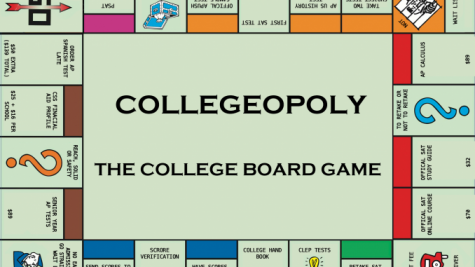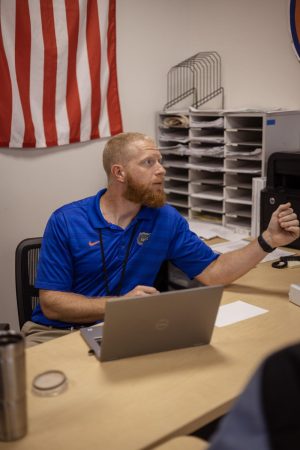It’s time to rethink how we do College Admissions
March 29, 2021
On Netflix, a recent documentary released called “Operation Varsity Blues: The College Admissions Scandal” detailed the events of the 2019 scandal in which wealthy families paid a “consultant” to “advocate” their child to a particular school. I think you get what I’m hinting at. Millions of dollars were spent on donating to schools, bribing sports coaches, and outright forging applications to ensure a guarantee for some of the top schools in the country (Medina et al). To many, including me, this didn’t surprise anyone. In the US, money can get you a lot of things. Whether it’s a private jet, or an easy in for an Ivy League, money will give you that power. Some of the most prestigious Universities were in on this scandal which has questioned the integrity of the college admissions system. More importantly, questioned the morality of a business model that profits off of the anxiety and exaggerated importance of higher education.

A recipe for disaster: How it all started
It’s hard to pinpoint where this all went wrong. Some point to the SAT and when it began to be considered in the college admissions process. Others say Affirmative Action encouraged lying and other falsifying practices. To understand the complex business of college admissions, there is no one exact fault. Rather a culmination of bumps and mistakes that led to the yearly cycle of induced anxiety for High School Seniors around the country.
The Standardized Testing Myth
For starters, no, the SAT or ACT will not predict how well you will do in college (Allensworth, Clark). Have you ever noticed that the general consensus of college predictions point to GPA and not the SAT? However, the SAT/ACT is dramatized to be the end all be all of your ticket to college. We’ve all been placed into the College Board Informational Pipeline since Middle School; that’s why. Most of the statistical information that College Board loves to showcase is done by studies that College Board has directly financed (Jaschik). This doesn’t discredit the researchers, but the validity may be skewed to benefit College Board. I’d love to hate on College Board more, but they do have some genuinely good programs. Advanced Placement is a very viable way to earn college credit and to subsequently raise your GPA. The problem is, once you take these classes, you get sucked into their system if you’re not careful enough.
The College Board Informational Pipeline (Or CBIP), is a term I just made up, but it is a very real phenomenon. College Board, who controls both AP courses and the SAT, use their name and record to promote one another (The Student Post). Those who are in AP courses are likely pushed to take the SAT. And if you’re not pushed by your teacher, who gets paid by College Board, then the barrage of spam emails telling you to take the SAT and its benefits will definitely push you as well. Not to mention, you likely set up your College Board account with your parents so they’ll be receiving the same emails about the SAT to ensure that you have just enough pressure to pay them the sweet $50 testing fee. And if that is not enough to convince you, the societal pressure of getting into college, which almost always requires an SAT score, that will probably be instilled in you by your junior year in high school will surely get you to take the test. All of this is almost guarantees you will take the SAT once in your high school experience.
So, now you’ve taken the test, maybe once, twice, or maybe five times. And if you’re still not satisfied with your score, the world of for-profit college test counseling welcomes you, and your wallet.

The For-Profit college counseling industry
It’s astonishing that we continually accept that this is an ethical industry. Let’s say I get an 1150 on my SAT. A pretty average score for most and a good starting point for this industry. I’m going to go to a tutor, who won’t teach me anything, other than how to take a test. The tutor, who charges $50 an hour will say “The SAT, barely measures academic knowledge, but rather memorization, patterns, and test-taking strategies. So, I’m going to teach you how to take this test.” They’ll show you the ins and outs of the test, shortcuts for questions, and the best yet, a paywall for a calculator program that will give you a considerable advantage in taking the test. May I add, a completely legal one. In the end, let’s say about $500-$1000 of my money is spent on upping my score.
To some, this is an essential expense and an expense that is worth it. To others, it’s a joke because they’ll never be able to pay for it. This industry, not regulated by the College Board, or any entity for that matter, is making the SAT more classist than it’s ever been (Carnvale et al). The SAT has become a game of means rather than a game of academic measurement. Even though this is the case, colleges still cling to the SAT and other standardized tests to wean out applications during the decision process. College Board has been making attempts to fix this, including a socio-economic score based on your living and area circumstances, but this is merely a bandaid to a pothole. The test itself needs to be thrown out to prevent the wealth advantage in testing. This industry needs a reality check, and a class in business ethics, because it is profiting off of the broken college admissions system and the anxiety of teenagers.
The consequences in the classroom
Now, you may be looking at these and recognize that it is a problem that needs to be fixed, but it’s all out-of-school. After all, the SAT and ACT don’t have in school classes so how can it affect other aspects of education. Theoretically, this would be true. However, with the introduction of AP, IB, and other college-level high school courses, college admissions have become the center of most high school academic life. It may seem like a good thing that students are taking college classes to boost their GPA for college. They are getting college credit if they decide to pay the $100 testing fee. The problem with AP classes is that they are very limited in their scope.
Here is the usual scenario students go through; “I’d certainly loved to take guitar my junior year. It’s an instrument that’s been on my bucket list forever. But, to get into my dream school, I have to have over a 4.0 GPA. Guitar doesn’t boost my GPA enough, so bye-bye music passion. Instead, I’ll opt-in for a class that I will probably not be interested in, slug my way through the year to get an A, and study to the point of insanity to get college credit.” All for a +1.0 GPA boost that gives me a slightly better chance to get into my dream school.
As we have introduced these college-level, rigorous courses, we’ve forced students into taking classes for how it looks on our transcript, not genuine enjoyment. This makes the high school experience unbearably obsessive. If I had a nickel for every time I’ve talked about the AP classes I’ll be taking, the SAT I just have to get a good score on, or anything really needed to get into a decent college, I’d almost be able to afford the SAT testing fee.
The shared experience of utter anxiety and obsession is prevalent among many high school students. (Luthar). It ruins the high school experience, unless your freshman homecoming didn’t do that to you already, and also ruins the high school curriculum. We see this in schools today as more fine arts programs are underfunded and core classes become tailored towards goals that promote college skills (TBS). This can be even seen in our school as instead of English 3 being offered, which includes reading literature and essential English development, AICE General Paper has replaced it which teaches students how to write papers; a skill that they will likely not need past the age of 22. We’ve created an environment centered around getting to college, and if you fall behind or don’t fit into that status quo, then you’re flagged as “at-risk.”
The token child syndrome
If the stress of almost all of your teachers, emails, and friends constantly talking about the importance of good grades and test scores wasn’t enough, meet the pinnacle of all anxiety-filled nights; your parents. The worst thing we ever want to do is disappoint our parents. After all, they’ve done so much for us, the least we can do is put in the effort to get into college. And yes, a push from your parents is good, but in moderation. There comes a point when we get to the “token child syndrome,” another term I made up for this article. This is when parents push their children to go to the most prestigious schools and get the most prestigious jobs (Like a lawyer or doctor), to look good for themselves. After all, the true meaning of life is to brag about your spouse’s success in getting into an Ivy League school at dinner parties while your spouse hates his life. And anytime teenagers do speak out about this syndrome that plagues many households across the country, we are called “lazy” and “disappointments.” There’s no winning in cases like this. If you aren’t mentally destroyed in school by the constant pressure to get good grades for college, then your parents surely will do that as well.
What can we do to fix this?
When approaching this article, it felt like this question was a given and that it would be easy to answer. Five hours of research later, I feel more hopeless than I started. This question is essentially trying to fix 40-50 years of education mistakes that have led to the mess of our education system today. A revolutionary change is needed to liberate the education system and subsequently, the college admissions dilemma. One that would remove education from for-profit companies and prioritize development rather than check marks off of a skills sheet. Such a radical change, wouldn’t come along easy and might not come along for a while. For the purposes of this article, and my own sanity, three main things could potentially create a slightly larger bandaid for this sinkhole we are in.
Removing the SAT/ACT from college applications
This one seems to be a given. It is a radical change that needs to happen to move away from the lucrative college counseling industry. Removing the SAT/ACT will not shutter College Board as they have a diversified set of products for students (Fairtest). AP Classes will still survive but the for-profit college counseling industry will not. And that is a good thing.
This will also force colleges to rethink how they read and evaluate applications. Some may even consider adding personality tests or other interest-based assessments rather than basing admission off of statistics teenagers obsess over. Regardless, the false narrative of SAT scores determining your college success will finally be put to rest.
Encourage an educational culture of interests rather than statistics
This must come from the high schools themselves. Too often many students get caught up in a mess of taking 4-5 AP classes to make themselves look good to colleges. It is important to pressure yourself, but it diverts from the true reasoning of education which is finding your interests by taking a diverse class schedule. In fact, students who do take a more interest-based schedule are more attentive and tend to perform better academically (Harackiewicz et al). Offering honors courses in subjects that are outside the STEM and core classes are very important to keep the class both challenging and interesting. The class that makes students not want to skip is a class that is doing its job well.
Place funding into extracurricular activities and fine arts
Extracurricular activities and fine arts are usually some of the greatest classes you’ll ever take in high school. Our school’s 3-D studio art budget was around $100. That same $100 paid for one student to take an AP exam. It is crucial to keep these classes well funded as these may be the only creative lifeline they encounter beyond elementary school. Extracurricular activities allow for students to embrace their true selves and also experiment with things they may enjoy. Some schools have their own internal grant money they can award to clubs and organizations to keep them afloat. If a school has the means to do this, they should protect it at all costs.
Concluding statements
Of course, this is all contingent on a very fragile thing; tax dollars. Schools must be well funded for this model to work. I firmly believe if we can make the changes in high school, the colleges will be forced to change their ways as well. It seems fairly tiring to hear the same “we need to fund schools more” argument, but it is something that still has yet to be delivered. Only then will we see changes in the high school system and the college system beyond.
Citations
Allensworth, Elaine M., and Kallie Clark. “High School GPAs and ACT Scores as Predictors of College Completion: Examining Assumptions About Consistency Across High Schools.” Educational Researcher, vol. 49, no. 3, 2020, pp. 198–211., doi:10.3102/0013189×20902110.
Best Schools, The. “Common Core’s Orphaned Subjects: Music and the Arts.” TheBestSchools.org, Thebestschools.org, 23 Mar. 2020, thebestschools.org/magazine/finearts/.
Carnevale, Anthony Patrick, et al. The Merit Myth: How Our Colleges Favor the Rich and Divide America. The New Press, 2020.
“College Board Defends Profits.” FairTest, www.fairtest.org/college-board-defends-profits#:~:text=For%20the%20most%20part%2C%20the,to%20ETS%20for%20contract%20services.
Harackiewicz, Judith M., et al. “Interest Matters: The Importance of Promoting Interest in Education.” Policy Insights from the Behavioral and Brain Sciences, vol. 3, no. 2, 2016, pp. 220–227., doi:10.1177/2372732216655542.
Jaschik, Scott. New Research Suggests That SAT under- or Overpredicts First-Year Grades for Hundreds of Thousands, 2016, www.insidehighered.com/news/2016/01/26/new-research-suggests-sat-under-or-overpredicts-first-year-grades-hundreds-thousands.
Luthar, Suniya. “Speaking of Psychology: The Mental Price of Affluence.” American Psychological Association, American Psychological Association, 2014, www.apa.org/research/action/speaking-of-psychology/affluence.
Medina, Jennifer, et al. “Actresses, Business Leaders and Other Wealthy Parents Charged in U.S. College Entry Fraud.” The New York Times, The New York Times, 12 Mar. 2019, www.nytimes.com/2019/03/12/us/college-admissions-cheating-scandal.html.
Staff, Student Post. “The College Board’s Monopoly on Education.” The Student Post, 23 June 2019, www.studentpost.org/2017/11/college-board-monopoly-on-education/.














